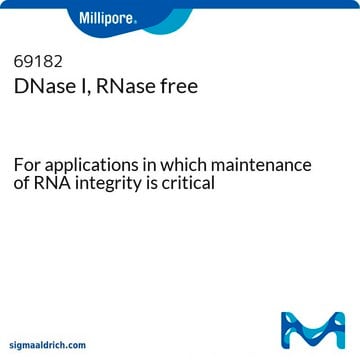D2821
Deoxyribonuclease I bovine
recombinant, expressed in Pichia pastoris, lyophilized powder, RNAse and protease, free
Synonym(s):
DNAse I, Deoxyribonucleate 5′-oligonucleotido-hydrolase
About This Item
Recommended Products
biological source
bovine
Quality Level
recombinant
expressed in Pichia pastoris
form
lyophilized powder
specific activity
≥4,000 units/mg protein
mol wt
~39 kDa
technique(s)
DNA extraction: suitable
solubility
H2O: soluble (pH 4.0-9.0)
suitability
suitable for molecular biology
application(s)
diagnostic assay manufacturing
foreign activity
RNAse and protease, free
storage temp.
2-8°C
Looking for similar products? Visit Product Comparison Guide
Application
Biochem/physiol Actions
Features and Benefits
- RNA purification by removing DNA
- Prepare DNA for nick translation1
- Footprinting assays to determine DNA-protein interactions2
Unit Definition
Physical form
Preparation Note
Storage Class Code
11 - Combustible Solids
WGK
WGK 3
Flash Point(F)
Not applicable
Flash Point(C)
Not applicable
Certificates of Analysis (COA)
Search for Certificates of Analysis (COA) by entering the products Lot/Batch Number. Lot and Batch Numbers can be found on a product’s label following the words ‘Lot’ or ‘Batch’.
Already Own This Product?
Find documentation for the products that you have recently purchased in the Document Library.
Customers Also Viewed
Our team of scientists has experience in all areas of research including Life Science, Material Science, Chemical Synthesis, Chromatography, Analytical and many others.
Contact Technical Service











